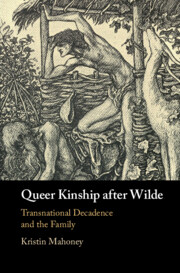Introduction
Published online by Cambridge University Press: 15 September 2022
Summary
The introduction considers the appeal Decadence and the work of Oscar Wilde held for queer, cosmopolitan subjects in the early-twentieth century who wished to reimagine structures of kinship. Decadence’s association with sexual dissidence and curiosity along with Wilde’s reputation as a sexual martyr informed the thinking of authors and artists in the twentieth century who worked to generate alternatives to heteronormative practices of affiliation. These figures operated alongside but saw themselves as distinct from high modernist networks, turning to the fin de siècle past to express their sense of distinction from the aesthetic modes in fashion at the time. While Wilde’s capacity for reimagining new modes of kinship informed more liberatory strains of twentieth-century Decadence, his interest in age-differentiated eroticism and the more general tendency to Orientalism within the Decadent Movement also inflected the practices marked by his influence during this period. The introduction thus stresses that the kinship experiments of twentieth-century Decadents carried forward the many political valences of their source material and that their work should be approached through the framework of what Kadji Amin has called “deidealization,” a mode of queer historical practice that acknowledges that queer alternatives are not always just alternatives.
- Type
- Chapter
- Information
- Queer Kinship after WildeTransnational Decadence and the Family, pp. 1 - 30Publisher: Cambridge University PressPrint publication year: 2022

